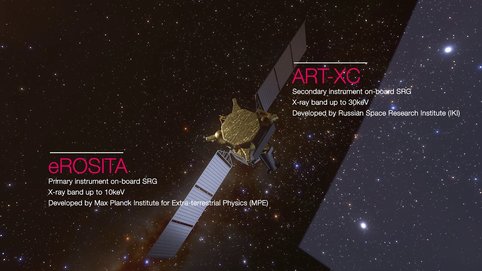eROSITA
eROSITA is the primary instrument on-board the Russian-German "Spectrum-Roentgen-Gamma" (SRG) mission which was successfully launched from Baikonur on July 13, 2019 and placed in a halo orbit around the L2 point. eROSITA will perform the first imaging all-sky survey in the medium energy X-ray range up to 10 keV with an unprecedented spectral and angular resolution.
The nature of the mysterious Dark Energy, which is driving the Universe apart, is one of the most exciting questions facing astronomy and physics today. It could be the vacuum energy, corresponding to the Cosmological Constant in Einstein's theory of General Relativity, or it could be a time-varying energy field. Answering this question could be the starting point of a fundamental revolution in physics.
Clusters of galaxies are the largest collapsed objects in the Universe. Their formation and evolution is dominated by gravity, i.e. Dark Matter, while their large scale distribution and number density depends on the geometry of the Universe, i.e. Dark Energy. X-ray observations of clusters of galaxies provide information on the rate of expansion of the Universe, the fraction of mass in visible matter, and the amplitude of primordial fluctuations which are the origin of clusters of galaxies and the whole structure of the universe.
The main scientific goals are
- to detect the hot intergalactic medium of 50-100 thousand galaxy clusters and groups and hot gas in filaments between clusters to map out the large scale structure in the Universe for the study of cosmic structure evolution,
- to detect systematically all obscured accreting Black Holes in nearby galaxies and many (up to 3 Million) new, distant active galactic nuclei and
- to study in detail the physics of galactic X-ray source populations, like pre-main sequence stars, supernova remnants and X-ray binaries.
The eROSITA telescope consists of seven identical Wolter-1 mirror modules. Each module contains 54 nested mirror shells in order to meet the required sensitivity. A novel detector system has been developed by MPE on the basis of the successful XMM-Newton pn-CCD technology.
The eROSITA mission
eROSITA orbit
© High-Energy Astrophysics Group at MPE

